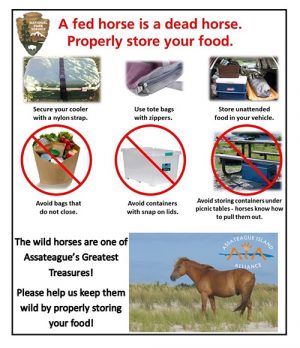
BERLIN – As the summer season commences, visitors to Assateague Island National Seashore are being reminded to keep food away from the wild horses.
In October, the Assateague Island Alliance (AIA), a nonprofit friends group that supports the national park, launched the “A Fed Horse is a Dead Horse” campaign in an effort to prevent Assateague’s wild horses from accessing food campers bring into the park.
Ashlie Kozlowski, outreach coordinator with AIA, said the nonprofit is currently working with park officials to install educational messages onto picnic tables and hand out nylon straps that will prevent the horses from opening coolers and bags, but are asking visitors to not feed the horses and to maintain a safe distance from the herd.
“People think of these horses as a domestic animal that requires a connection with humans in order to survive successfully,” she said. “They think the horses want to be pet, that they want to be touched, that they want and need to be fed. In reality, that’s not the case at all.”
Because the herd eats low-nutrient, high-fiber foods, Kozlowski said wild horses found on Assateague are not able to digest food that visitors bring into the park. Last summer, for example, a wild horse known as Chama Wingapo died after eating a large amount of dog food. The rich food caused an impaction that resulted in the rupture of the mare’s intestine.
“It put a microscope on this problem and made the public aware,” she said. “It showed us how timely this initiative is. It’s not only protecting humans and horses physically, it also preserves the wild behaviors of the horses, which is what makes Assateague so unique.”
In addition to sharing the message that “a fed horse is a dead horse,” AIA is helping to distribute nylon straps and educational material. The nonprofit is also looking to install new wildlife-proof picnic tables with built-in storage compartments by next March.
“We’re excited for this campaign and we’re excited at the opportunity to make positive change,” she said. “We’re hoping this is the beginning of many strategies that will be put in place to make the interactions between horses and humans more positive.”
Kozlowski noted that the horses have been known to kick or bite when approached by humans or defending food sources and tend to linger along roadways in search of handouts from passing vehicles.
“This whole initiative is to reverse that behavior moving forward,” she said. “The long-term goal is to dehabituate the horses from associating humans with food, which will reduce the number of negative interactions that humans have with wildlife. The short-term goal is to keep the food inaccessible to horses. There are very simple ways to make that happen. It is just a matter of getting people accustomed to preparing themselves when they come to Assateague.”
Kozlowski urged visitors to do their part to protect the park’s herd this summer season.
“National parks are designed for people to enjoy national treasures, to keep them from being developed and to allow the landscapes to evolve unaltered by humans,” she said. “We are visitors, we are observers and it is a privilege for us to be there.”

